 Flirting with Fifty by Jane Porter
Flirting with Fifty by Jane Porter Format: eARC
Source: supplied by publisher via NetGalley
Formats available: paperback, ebook, audiobook
Genres: contemporary romance
Series: Modern Love #1
Pages: 336
Published by Berkley Books on May 24, 2022
Purchasing Info: Author's Website, Publisher's Website, Amazon, Barnes & Noble, Kobo, Bookshop.org
Goodreads
A sexy and sparkling later-in-life contemporary romance about a woman who leaps out of her comfort zone and takes a chance on love by New York Times bestselling author Jane Porter.
Paige Newsom is finally at a place in her life where she's comfortable. She loves her job as a college professor in Southern California, lives close enough to her mother to visit her regularly, and has three daughters who are flourishing in their own careers. Paige has no plans to upend her life again after her divorce eight years ago, but she's about to embark on a new adventure: co-teaching a course that includes a three-week international field study.
Paige can think of a dozen reasons why she shouldn't go, one being a dazzling Australian biologist who will be teaching alongside her. Professor Jack King is charismatic, a world traveler, and more like Indiana Jones than Indiana Jones, all of which unsettles Paige, who prides herself on being immune to any man's charms. As the two co-professors lead the rigorous program together, first on campus, then in beautiful Tanzania, Paige's biggest challenge will be working closely with Jack while resisting the undeniable chemistry she feels when she's with him.
My Review:
“We are too soon old, and too late smart” – at least according to an old Dutch proverb. Flirting with Fifty is the story of a woman who seems to be caught at the balance point between those two states.
Paige Newsom is just about to turn 50. The big 5-0. But it doesn’t seem all that big a deal to Paige, who finally has her life arranged the way she thinks she wants it. She has a marvelous job, in a place that’s close enough to home to feel “just right”. Also close enough to visit her mother back home on a regular but not too frequent basis.
Her career may have not hit stellar heights, but she’s done well enough for herself and she’s stable enough to be able to afford a home in coastal Southern California, have enough to help out her grown daughters when they need it, and save for her retirement.
Now that’s a bit closer than she likes to think about. Not that she won’t have enough saved. And not that being retired and alone isn’t amazingly better than being retired with her narcissistic, alcoholic, emotionally abusive, bullying ex-husband. It wasn’t all bad, after all, she got her girls out of it and they are her heart, but she stayed more than long enough to make her swear off all men.
So she’s not interested in meeting someone new. At all. Ever. Which means that shaking Paige out of her comfortable but slightly lonely romantic rut is going to require the re-introduction of someone from her past.
Jack King wasn’t the one that got away because Paige never let it get that far. Their one-night stand almost 30 years ago rocked her world. But she saw at the time that she could fall and fall hard for him, someone who clearly wasn’t ready to settle down or settle with someone. Or so she thought at the time.
Of course, at the time, she was only 20 and Jack was 25, pretty much a long time ago in the equivalent of a galaxy far, far away. Actually it was Paris, France, which was pretty damn far away from Paige’s home in SoCal.
Jack’s become a superstar in his field of studying climate change and human effects on the planet. He has his own show on the Discovery Channel and teaches around the world. He’s rather like a 21st century Indiana Jones – without the whip and the aversion to snakes.
And Jack is coming to her university in Southern California to team teach his specialty class and needs a co-teacher for the class who teaches advanced math and statistics. Her Dean has just voluntold her that she’ll be Jack’s co-teacher for the semester.
She’s mortified. Jack is intrigued. Because for him, Paige IS the one that got away. And this time he’s not planning to let her run off in the middle of the night before he has the chance to tell her how he really felt all those years ago.
And how he feels now.
Escape Rating A: I picked this up because of how rare it is to see a romance that centers people past their 30s. The only other one I can think of is Jasmine Guillory’s Royal Holiday. (Which was terrific and well worth a read!) Not that there isn’t plenty of women’s fiction where the story centers around a woman and her daughters where a romance occurs for the mother – not that I don’t love LOTS of those books – but those don’t center the romance the way that Flirting with Fifty does.
What made this work so well is that Paige is more-or-less content in the life she has created for herself. She has what she needs and most of what she wants and she’s not looking for more. It’s a good life. It also works well that we see enough of her thoughts and memories about her ex-husband to understand why she’s in the emotional place she’s in without dwelling on his abuse. She’s still affected by the past – as we all are – but her regrets don’t consume her.
She’s also mature enough to acknowledge that her actions with Jack in Paris happened the way they did because she wasn’t mature at all. She was young and insecure – not too surprising at 20 – and couldn’t cope with her own feelings. She was embarrassed and overwhelmed and she ran instead of dealing with him in what might have been a very awkward morning after.
The romance is lovely because they don’t pick up where they left off. There’s a lot of water under that bridge, and the only way to see if they have something now is to let it happen slowly if it’s going to happen at all. They move from colleagues to friends to more than friends to lovers in a hesitant but natural progression.
It makes sense that way. They’re not who they were 30 years ago. Who is? But they’re also not NOT who they were. Their younger selves are still inside them, and those selves have, if not exactly regrets, at least a certain wistfulness about that road not taken. So this time they decide to take a few steps down that road and see how it feels.
The other thing that made this story work is the way that the author captures the combination of the giddiness of falling in love again with the issues of already having lives and plans that will need to be adjusted and cooperated over to make anything work. And that both of them have pasts that are guaranteed to bite the relationship in the ass at times. As Jack’s certainly does.
He does an excellent patient grovel when required. It’s not glossed over and it’s not leapt past. Which meant that their HEA felt earned and included the acknowledgement that the “ever after” past of that equation was never going to be as many years as it might have been – but that those years will be filled with love.
As they should be.
I am utterly thrilled to learn that this is the first book in a series of romances centered on later-in-life couples. The next book, Flirting with the Beast, is coming in November. YAY!
Reviewer’s Note: As much as I loved Harrison Ford as Indiana Jones, the picture of Jack King in my head is Sam Neill – probably because of the accent. Your imaginary casting mileage may definitely vary.

 When She Dreams (Burning Cove, #6) by
When She Dreams (Burning Cove, #6) by  When I first visited Burning Cove, back in
When I first visited Burning Cove, back in  Sam, Maggie and the erstwhile blackmailer converge on Burning Cove, where a dream research conference – or con game – is being held under the auspices of the suspiciously glitzy Guilfoyle Institute.
Sam, Maggie and the erstwhile blackmailer converge on Burning Cove, where a dream research conference – or con game – is being held under the auspices of the suspiciously glitzy Guilfoyle Institute. What makes Maggie, and the other women in Burning Cove so fascinating is her realistic grasp on what it means to be a woman in a man’s world at a time when it’s all too easy for a woman to be overlooked, ignored, or in Maggie’s case, locked up for “her own good” by people who claim to love her and have her best interests at heart.
What makes Maggie, and the other women in Burning Cove so fascinating is her realistic grasp on what it means to be a woman in a man’s world at a time when it’s all too easy for a woman to be overlooked, ignored, or in Maggie’s case, locked up for “her own good” by people who claim to love her and have her best interests at heart.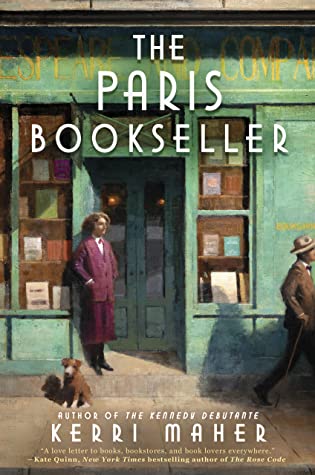 The Paris Bookseller by
The Paris Bookseller by 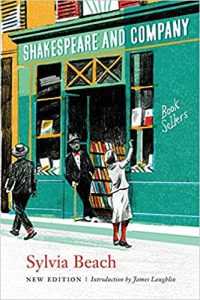 But, as happens more often than we think, it’s only fiction that has to be plausible. History just has to be true. And this story, or at least the big, important, supporting bones of this story, are that. Or close enough. (Beach herself wrote a memoir of this period, titled, of course,
But, as happens more often than we think, it’s only fiction that has to be plausible. History just has to be true. And this story, or at least the big, important, supporting bones of this story, are that. Or close enough. (Beach herself wrote a memoir of this period, titled, of course, 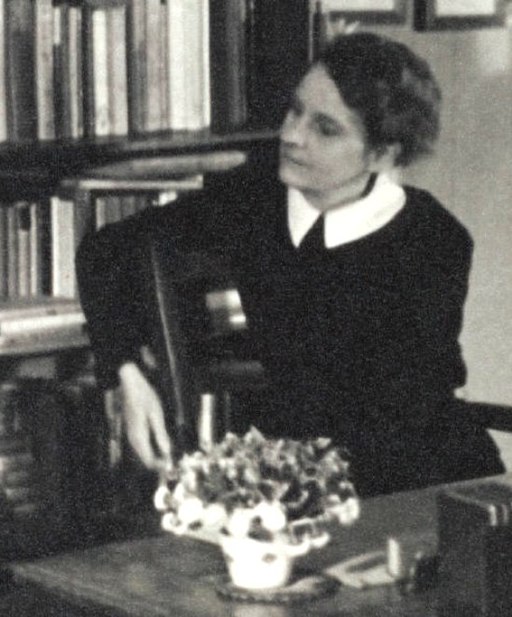
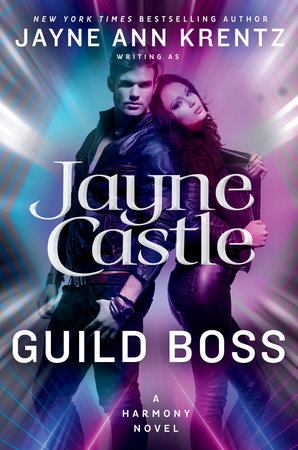 Guild Boss (Harmony, #14) by
Guild Boss (Harmony, #14) by 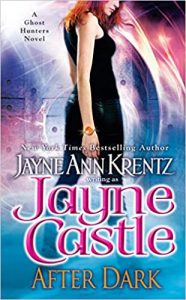
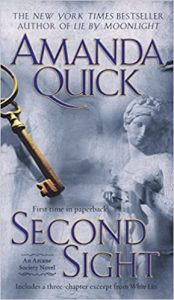

 All of that being said, my re-read of Ghost Boss was much more fun than my original read, so I’m very glad I took the trip back to Harmony. While it looks like it’s going to be awhile before the author returns to Harmony, I still have two books with her signature blend of romance, adventure and psychic phenomena to look forward to this year,
All of that being said, my re-read of Ghost Boss was much more fun than my original read, so I’m very glad I took the trip back to Harmony. While it looks like it’s going to be awhile before the author returns to Harmony, I still have two books with her signature blend of romance, adventure and psychic phenomena to look forward to this year, 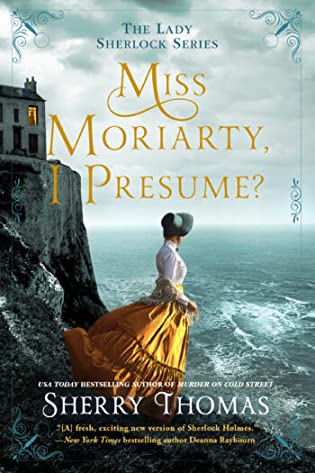 Miss Moriarty, I Presume? (Lady Sherlock, #6) by
Miss Moriarty, I Presume? (Lady Sherlock, #6) by  Charlotte Holmes doesn’t actually utter that paraphrase of Henry Morton Stanley’s famous greeting of Dr. David Livingstone in 1871, although she certainly could have. Miss Moriarty, I Presume? takes place in 1887, during the year of Queen Victoria’s Golden Jubilee.
Charlotte Holmes doesn’t actually utter that paraphrase of Henry Morton Stanley’s famous greeting of Dr. David Livingstone in 1871, although she certainly could have. Miss Moriarty, I Presume? takes place in 1887, during the year of Queen Victoria’s Golden Jubilee.

 Fixing to Die (Southern Ladies Mystery, #4) by
Fixing to Die (Southern Ladies Mystery, #4) by  And here we are, Fixing to Die. Because this is the last book in the author’s
And here we are, Fixing to Die. Because this is the last book in the author’s  But with a corpse on their hands – again – the Ducote sisters can’t resist playing Nancy Drew in order to figure out how the murderer got into and out of the locked room containing the victim. So they can figure out whodunnit, and why, and how.
But with a corpse on their hands – again – the Ducote sisters can’t resist playing Nancy Drew in order to figure out how the murderer got into and out of the locked room containing the victim. So they can figure out whodunnit, and why, and how. Fixing to Die turned out to be exactly what I was looking for on a very rainy autumn night. The cast of characters is a lot of fun, the family shenanigans are interesting and are somebody else’s, the murder victim needed to be taken out of the gene pool and his murderer got their just desserts. The sisters saved the day – as they always do – and their animals are along to provide just the right touch of comic relief.
Fixing to Die turned out to be exactly what I was looking for on a very rainy autumn night. The cast of characters is a lot of fun, the family shenanigans are interesting and are somebody else’s, the murder victim needed to be taken out of the gene pool and his murderer got their just desserts. The sisters saved the day – as they always do – and their animals are along to provide just the right touch of comic relief.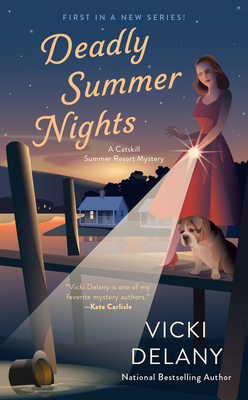 Deadly Summer Nights (Catskill Summer Resort Mystery #1) by
Deadly Summer Nights (Catskill Summer Resort Mystery #1) by 
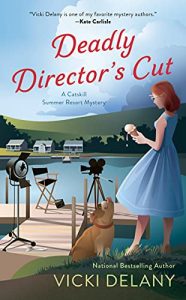 At first, I couldn’t figure out what was missing at Haggerman’s, until I realized that the context of who the clients were and who many of the owners were was entirely missing. If it was subtext it was so sub that I missed it. And I feel like a lot of the flavor of the area was lost.
At first, I couldn’t figure out what was missing at Haggerman’s, until I realized that the context of who the clients were and who many of the owners were was entirely missing. If it was subtext it was so sub that I missed it. And I feel like a lot of the flavor of the area was lost.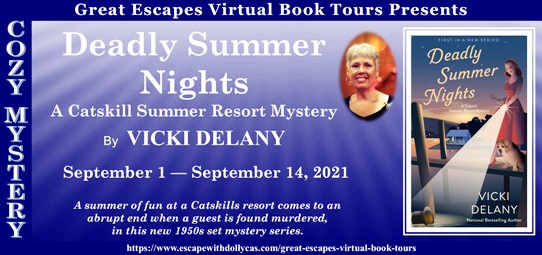
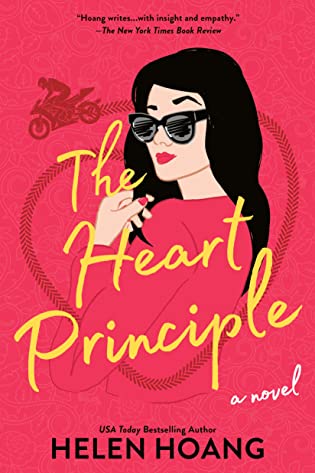 The Heart Principle (The Kiss Quotient, #3) by
The Heart Principle (The Kiss Quotient, #3) by 

 Wait for It by
Wait for It by 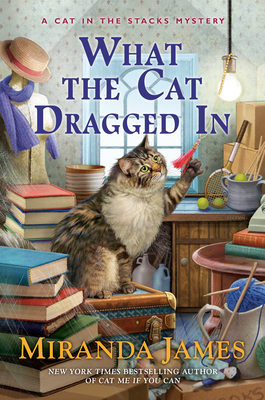 What the Cat Dragged in by
What the Cat Dragged in by 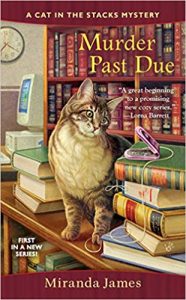 This book has been calling my name, loudly, with increasingly more high-pitched meows, until I finally just gave in and read it. The series features a 50-something librarian with the last name of Harris and his now two feline companions – one of whom is pictured on the cover of every book in the series. How could I possibly resist?
This book has been calling my name, loudly, with increasingly more high-pitched meows, until I finally just gave in and read it. The series features a 50-something librarian with the last name of Harris and his now two feline companions – one of whom is pictured on the cover of every book in the series. How could I possibly resist?